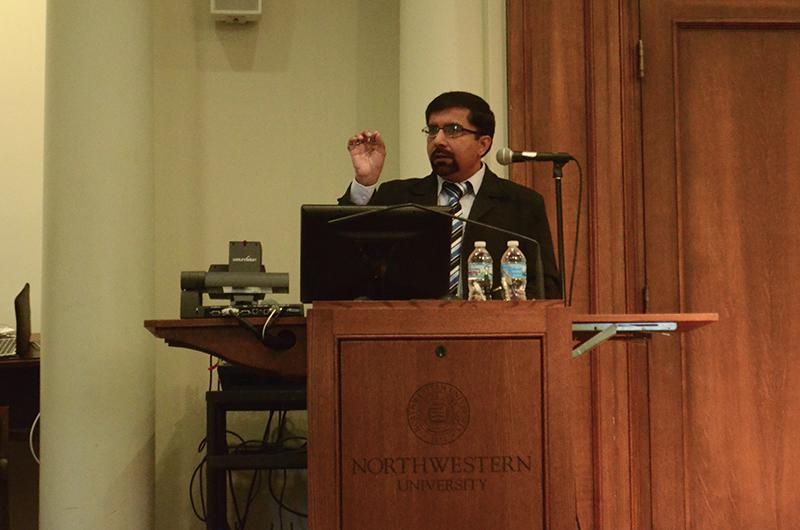Panel discusses relationship between religion, authority
Annabel Edwards/Daily Senior Staffer
Dr. Hamid Mavani speaks at a panel exploring the effects of religion within power structures. The Muslim-cultural Students Association held the talk Thursday evening in Harris Hall.
May 16, 2014
The Muslim-cultural Students Association hosted its spring speaker event Thursday night, with several talks on the role of religion, specifically Islam, in bodies of authority.
About 70 people attended the event, “Religion as the Oppressor? A Look at Authority, Freedom, and Faith,” which featured three speakers — Hamid Mavani, Haroon Ullah and Usama Canon.
Moderator Omer Mozaffar, a lecturer who specializes in contemporary Islamic issues, introduced Mavani, an author and translator focusing on Islamic theology and political thought. Mavani centered his argument on the problems inherent in the establishment of an Islamic state. He said many tend to idealize Islamic history, which prevents real issues from being discussed.
“The romanticized understanding of our history does not meet the test of historicity,” Mavani said. “There were wars and inter-Muslim rivalry. We need to be realistic and pragmatic, and we must be really honest as scholars and as devotees.”
Mavani said there are two extremist understandings of Islam. The maximalist position, he said, believes Islam covers every aspect of life, while the minimalist position argues the Quran teaches nothing about dealing with public policy. Mavani said both positions are incorrect.
“The Quran is not a book of laws, and it is not a manual on how to establish an Islamic state,” he said. “That is not the core purpose. What it aims to do is to cultivate certain moral and ethical virtues.”
Mavani concluded his portion of the discussion by covering the drawbacks to instituting an Islamic state. He said there is no such thing as the Islamic state.
“If anything goes wrong, Islam is to be blamed,” he said. “This kind of amalgamation becomes a problem, because it creates disillusionment and alienation because nobody is accountable. It becomes an instrument for grabbing power.”
The conversation was then turned over to Ullah, a member of Secretary of State John Kerry’s policy planning staff since last year. Ullah discussed the concept of secular neutrality. He said there are three myths about that concept, including that state neutrality limits faith-based engagement, state neutrality limits individual religiosity and state neutrality is a key part of democratization. Contrary to popular belief, Ullah said, state neutrality does not diminish the role of religion in a society. In fact, it often helps it thrive.
“State neutrality can allow it to move forward,” he said. “A lot of these religious organizations are allowed to flourish because they have to make that choice. There are certain incentives they can put into place to mobilize.”
The idea of choice carried over into Ullah’s last remarks, when he told the story of Rais Bhuiyan, a Muslim student who was shot by extremist Mark Stroman 10 days after the Sept. 11 attacks. Bhuiyan survived and went on to forgive Stroman and work toward getting him taken off of death row. In the end, Stroman was executed, but Ullah said it was the perfect example of the way Islam teaches the ideals of choice and compassion.
The final speaker, Canon, studies Islamic sciences and is the founding director of Ta’leef Collective, a nonprofit that assists people who convert to Islam. Canon converted in 1996 and said he sees Islam as an “intersection of real spiritual practice and a force for justice.”
“What does it mean for us as Muslims living in America?” he said. “Does being left to our own conventions strengthen or weaken our faith?”
Canon stressed the importance of seeing America’s relationship with the Muslim community as a work in progress. Otherwise, he said, religious freedom could be compromised. He added people need to recognize local issues and take meaningful action to change them.
“The prophet called both the oppressor and the oppressed your brother,” Canon said. “In the attempt to end oppression, we do that in the spirit of fraternal love.”
Weinberg sophomore Owais Ansari, the organizer of the event and executive vice president of McSA, said he chose the topic because he felt it was relevant to students both in the U.S. and abroad.
“We wanted to compare the experiences of living in a nonsecular and secular nation,” he said. “We wanted to get these two faces of how it feels to be religious in those two societies.”
Email: [email protected]
Twitter: @olivesocean


